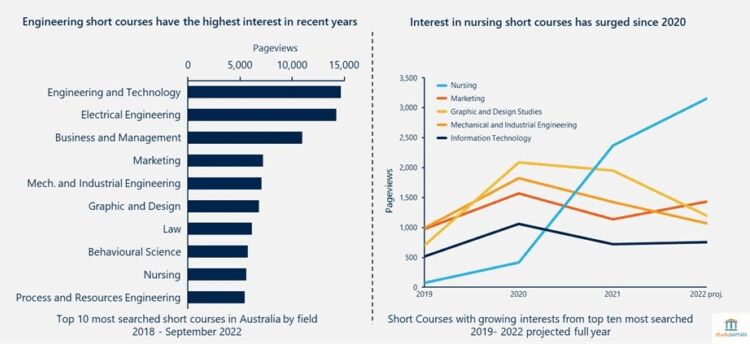Idea In Brief
Growing market
The market for microcredentials is expanding, and the pace is set to accelerate. Government and industry are encouraging both microcredential demand and supply, to address the changing skills environment, and to support lifelong learning.
Limited resources
A challenge facing universities in exploring microcredentials is where to focus resources. Without evidence of what types of students want to study what microcredentials, it’s challenging to make the case for investing on a coherent portfolio.
Studyportals data
Studyportals data allows universities to explore market opportunities through revealed preferences. Using large-scale, real-time data on the short course prospective students are most interested in provides rich insights about current and future demand.
The market for microcredentials is expanding, and the pace of growth is set to accelerate as workplaces and careers transform. Government and industry are encouraging both microcredential demand and supply, in part to address the rapidly changing skills environment and to support a shift to lifelong learning.
With legislation providing FEE-HELP coverage for contributing units currently before Parliament and a national microcredentials marketplace expected to go live later this year, there is substantial opportunity for universities to grow their reach, impact and revenues through a curated portfolio of high-quality microcredentials.
A key challenge facing universities in exploring microcredentials is where to focus limited resources. To date many microcredentials have been repackaged from existing online content, with a hit-and-miss approach to market entry. Compared to undergraduate and postgraduate study, there is little publicly available data on microcredential demand. Without evidence of what types of students want to study what microcredentials, it’s challenging to make the case for investing time and resources on a coherent microcredential product portfolio.
In our experience there are multiple data sets that can help triangulate where to focus microcredential investments. Coursera’s data on MOOC (massive open online courses) uptake is a useful way of assessing demand and potential revenue opportunities, with around 5 per cent of MOOC students opting for paid credentials. And Lightcast data on industry skills demand can point to emerging opportunities for both B2C and B2B microcredential offers.
But data from Studyportals is particularly valuable, providing insights on student interest, including in local demand for short courses. Studyportals is a global study choice platform, listing 200,000 courses at more than 3,750 educational institutes across 110 countries. Australian institutions are heavily represented on the platform. Nous partners with Studyportals to provide clients with rich insights from this global data set about national and international prospective student demand and characteristics.
Studyportals data allows universities to explore market opportunities through revealed preferences. Using large-scale, real-time data on the short courses prospective students are most interested in provides rich insights about current and future demand. We know from reviewing full program data that there is a high correlation between Studyportals pageviews and actual demand, and Studyportals data is also a powerful early indicator of future demand, predicting future enrolment growth a year or more in advance.
This chart below illustrates some areas for which students in Australia are searching for short courses and how demand is changing.

Triangulating demand growth with deeper exploration of prospective student characteristics (such as demographics, life stage, location and price points) means that microcredentials can be targeted and promoted to maximise their reach and impact.
In combination, the rich insights from this data can be powerful in maximising ROI from marketing, including through stimulating demand growth. For universities eyeing growth opportunities, this data insight is worth its weight in gold.
Get in touch to explore how you can apply these approaches in your institution.
Prepared with support from Doron Chimes, Mia Juritzen and Keven Chen.
Connect with Peter Wiseman and Zac Ashkanasy on LinkedIn.



